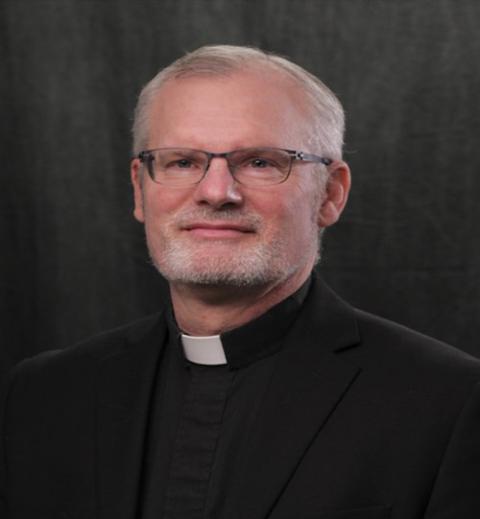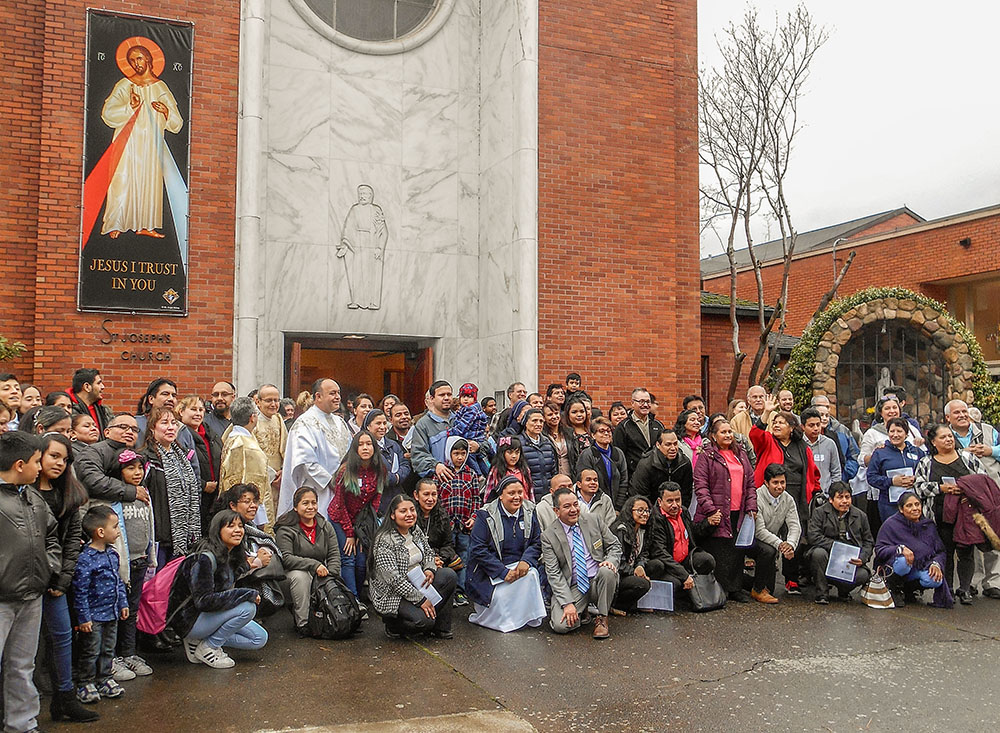
Participants in the Portland Archdiocese's gathering as part of the V Encuentro process pose on Jan. 27, 2018, outside of St. Joseph's Church in Salem, Oregon, where the meeting took place. The local encuentro attracted some 300 parish leaders who discussed priorities for Hispanic/Latino ministry in western Oregon. (NCR photo/Peter Feuerherd)
In a move that has roused frustration and anger in the local Latino Catholic community, Portland Archbishop Alexander Sample recently instituted sweeping cutbacks in the ministry caring for the pastoral needs of Hispanics, who account for about 60% of the Catholic population in his Pacific Northwest archdiocese.
Ministerio Hispano went from an office with two staff members and a website to an inaccessible website and one staffer with the title "director" but who has full-time work elsewhere.
In a July 2 internal memo to pastoral center employees, obtained by NCR, Auxiliary Bishop Peter Smith said the changes are temporary and necessary due to "significant financial challenges."
The pastoral ministries team, which included the longtime director of the Marriage and Family Life Office and Patricia Montana, Hispanic ministry parish liaison, "has been temporarily disbanded to allow us to increase our focus on pastoral planning and determine the future needs of pastors and parishes," wrote Smith. "As we progress in pastoral planning, we will rebuild the pastoral ministry support functions."
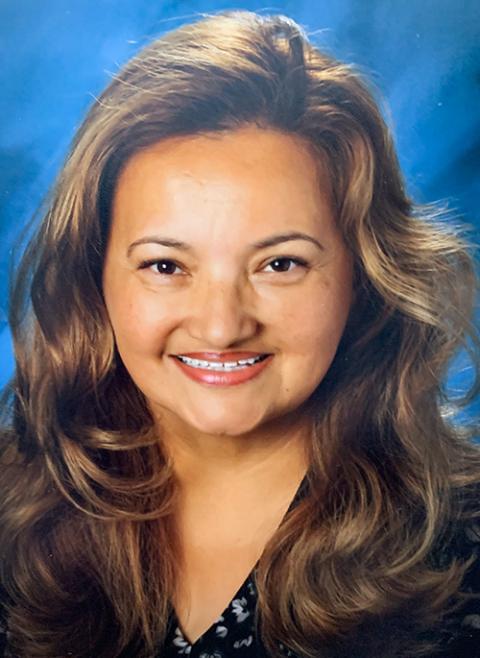
Patricia Montana (Courtesy of Patricia Montana)
But members of the Latino Catholic community told NCR the Hispanic ministry is too large and important to suspend temporarily and that recent decisions were made without consulting or communicating with them. And they assert that the firing of Montana, who performed the bulk of the ministry's work, is part of an ongoing disregard for Latino people in the local Catholic Church.
"It feels like the archdiocese doesn't truly care about us," said Alejandro Bautista, youth ministry coordinator at St. Andrew Parish in Portland. "The community is fearful and confused and concerned."
The shakeup occurs as dioceses across the country begin to implement a major national pastoral plan from the U.S. bishops focused on Hispanic Catholics. It is the result of a four-year discernment and reflection process called "V Encuentro."
"We were in the middle of working on important things, when suddenly they shut the doors to us," said José Montoya, a permanent deacon serving a parish in Newburg, Oregon.
The deacon is a member of the archdiocesan pastoral council, a group of about 20 people tasked with representing the region's Catholic community and helping inform the archbishop's decision-making.
Montoya said Sample never asked the council for input on the Hispanic ministry changes, and there was no mention of the restructuring during a meeting June 15, days before Montana was fired.
NCR reached out to Deacon Kevin Welch, head of parish pastoral support for the Portland Archdiocese, with an interview request about the restructuring. The deacon said he could not answer questions for a month, because leadership was in the middle of making changes and he did not want "partial info to be misinterpreted."
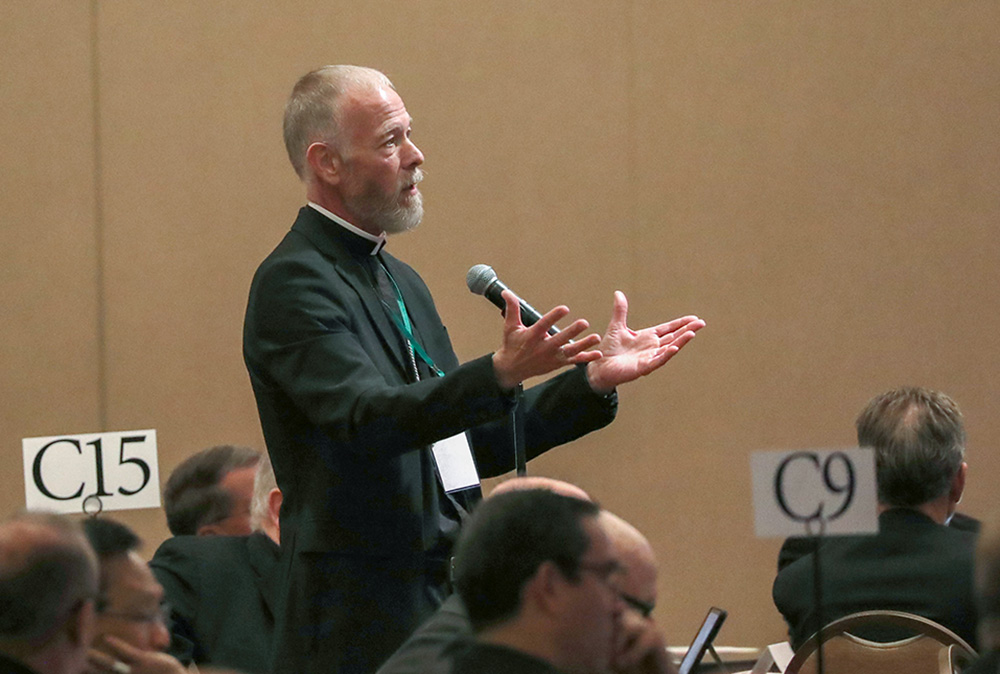
Archbishop Alexander Sample of Portland, Oregon, speaks from the floor June 14 at the U.S. Conference of Catholic Bishops' Spring Plenary Assembly in Louisville, Kentucky. (OSV News/Bob Roller)
On June 27, Montana was notified by Fr. Mike Kueber, director of Hispanic ministry, that it was her last day. In a letter shared with NCR, Kueber told Montana her position had been eliminated "due to the restructuring of parish support programs." She received two weeks' severance pay.
Several days prior, Kueber had been assigned parish administrator of St. Patrick Parish in Canby, Oregon, about 25 miles south of Portland. He'd been working part time at Mount Angel Seminary in Oregon, and several Catholic Latinos said Montana always carried most of the ministry's responsibilities on her shoulders.
"Fr. Mike was present at events but Patricia, deeply connected to the community, was doing most of the work," said Verónica Vázquez, a member of St. Matthew Parish in Hillsboro.
Hispanic leaders said they are baffled as to why Kueber, as of July 14, remains listed as director of Hispanic ministry on the archdiocesan website.
"With his other full-time responsibilities now, I appreciate that he will only have a little time for the Hispanic ministry," Bautista said. "How does that possibly make sense when Hispanics account for a majority of your population? It's honestly a joke."
The same day Montana was terminated, Bautista and Ricardo Hernández, former membership director for the Oregon Knights of Columbus, composed a letter detailing what had occurred and sent it to leaders in the Hispanic Catholic community. The men asked for prayers and "moral support" as they prepared to request a meeting with the archbishop.
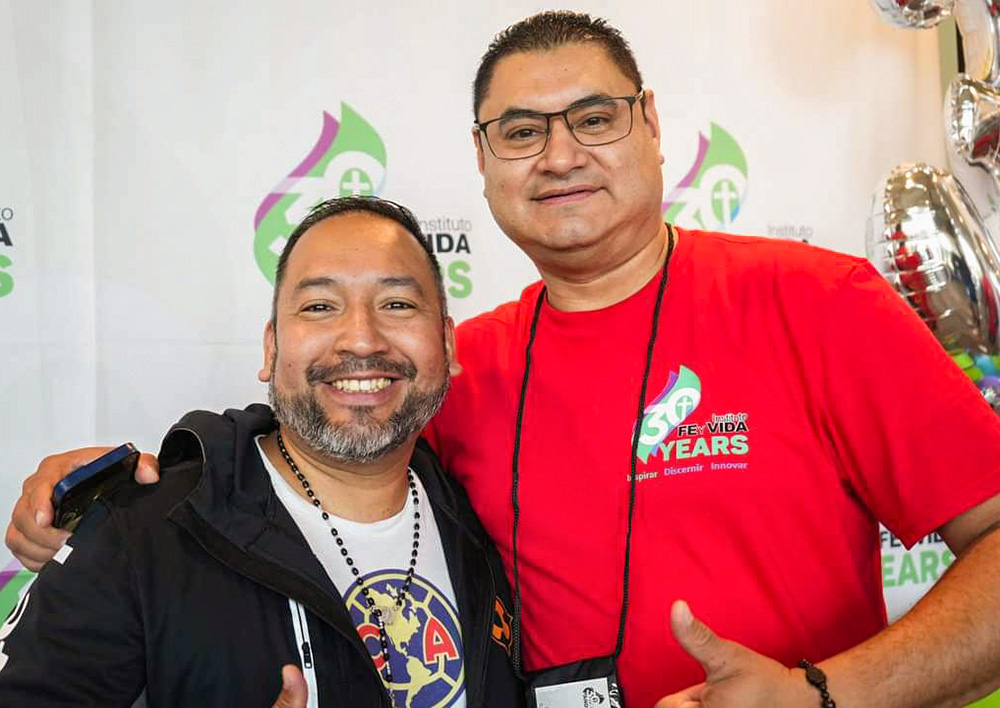
Oregon Catholics Alejandro Bautista and Ricardo Hernández are pictured June 23 at Instituto Fe y Vida's national Catholic leadership program for Hispanics, where Msgr. Lucio Adrián Ruiz, secretary of the Vatican's Dicastery for Communication, spoke to attendees. The two men said the Portland Archdiocese, without a clear explanation, recently turned down an offer from the institute to provide a free formation program to parishes in the archdiocese. (Courtesy of Alejandro Bautista)
"As leaders, we have the right, but mainly the obligation, to raise our voices for the weakest or those who do not have a voice, just as Jesus asks us to," they wrote in Spanish.
The letter lists a series of Sample's past actions, among them directing parishes to change religious education for Hispanic youths to English, failing to offer Spanish-language programs to support priests and permanent deacons, and appointing Kueber, "an Anglo priest, to represent us," a priest with "zero knowledge about the needs of our community."
In 2023, Kueber published a book, Preaching to Latinos: Welcoming the Hispanic Moment in the U.S. Church, in which he calls for greater cultural understanding of Latinos and highlights the essential role of listening to the community.
Kueber did not respond to several questions and a request for comment; he directed NCR to Welch.
According to Bautista and Hernández, Kueber said during a July 9 Zoom meeting with members of the Hispanic community that there is a $1 million budget deficit in the archdiocese.
Hernández said the priest called the meeting with only about four hours' notice, so many people were not able to attend. Kueber was a sympathetic listener as people shared their distress, said Hernández, but the only new information provided was the budget figure.
The staff cuts were not planned but needed to occur given the financial picture, Bautista and Hernández recalled Kueber saying.
"We told him that kind of sounds like BS to us," said Hernández, who owns a mortgage company and has been in finance for 25 years. "Anyone who does budgeting knows ahead of time your budget is coming up short. They should have had better planning — and had more of a heart as a human being, as a religious person."
Latino Catholics in the archdiocese told NCR there were numerous other examples of deprioritizing or neglecting the community. For example, the Hispanic ministry leadership position remained vacant for about three years, and a successful youth retreat for Latinos was cut while the Anglo version continued. Montana and others said five Latino priests have left the archdiocese in the past few years.
Described as a tireless worker who gave late nights and weekends to the ministry, Montana organized meetings with community lay leaders, priests, deacons and religious to improve education and ministry for Hispanics at parishes.
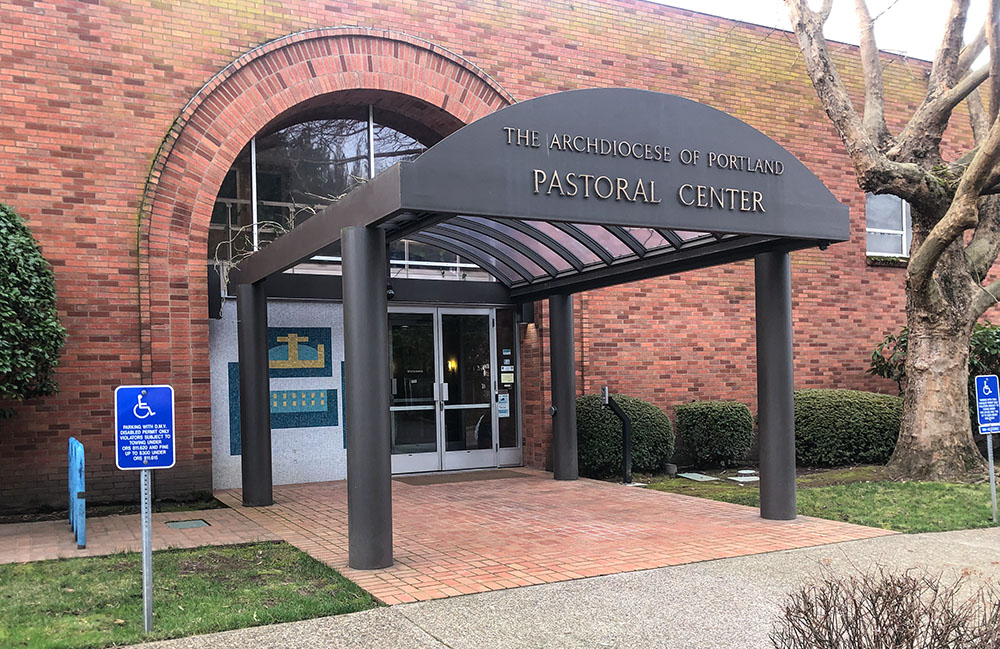
The administrative offices of the Archdiocese of Portland, Oregon (NCR photo/Katie Collins Scott)
She also helped coordinate a pastoral leadership training program with Instituto Fe y Vida, a ministry that the LaSallian Christian Brothers founded for Hispanic Catholics. This April, 95 lay leaders from 25 parishes received a certification through the program.
Fe y Vida's staff was impressed with the enthusiasm and commitment of program participants and offered to provide a free, parish-based program for Hispanic families, said Montana. Without a clear explanation, according to Montana and others, the archdiocese rejected the offer.
"We need education, we found it, we can put it together," said Bautista. "But the archbishop or the people around the archbishop are having him put up barriers."
In early June, a group of Latinos from the Portland Archdiocese attended a training in the Seattle Archdiocese to prepare for the implementation of the national pastoral plan. On June 6, Alejandro Aguilera-Titus, assistant director for Hispanic ministry at the U.S. Conference of Catholic Bishops, gave an overview of the plan at an Oregon parish.
Advertisement
Aguilera-Titus told NCR in July that the bishops say there are three key elements necessary for a successful Hispanic ministry. It should have:
- Direct access to the bishop, one not "removed through various layers of personnel";
- Its own budget and resources;
- A collaborative approach with other diocesan offices.
Hernández and Bautista said none of these elements currently exist in Portland, and many Latinos are concerned about the future of the pastoral plan locally.
"Are we allowed to continue our work without the archdiocese?" said Vázquez. "We are a large and growing community, and we are in limbo."
A number of other pastoral ministry programs, such as the life, justice and peace office and a deaf ministry, were dissolved over the past few years. In a surprise move last summer, the archbishop closed the Catholic schools office, fired the superintendent and her staff, and reconfigured the office to have a greater focus on evangelization.
Meanwhile the archdiocese hired for at least one new position, bringing on a pro-life coordinator.
Following the disbanding of pastoral ministries, the Hispanic ministry page was removed from a menu on the archdiocesan website. As of July 14, it was possible to find the page via an internet search, but a variety of content is gone. (An internet archive includes the previous version.)
"Why did they pull it off the website as if we are not here, we don't exist?" said Vázquez.
According to Hernández, when he requested a meeting with the archbishop, Sample's executive assistant told him that, due to the restructuring, the prelate would not be meeting with anyone but that he would instead delegate someone to have a conversation.
Bautista said they will continue to "respectfully demand" a conversation with Sample. "We are not going to be fighting, we are just going to ask for real answers, for him to tell us the truth," said Deacon Montoya.
The Latino community generally has a great respect for its leaders, especially priests and bishops, Bautista said, but "we are trying to ask for what's right, standing up for ourselves."
There also are plans for an upcoming Holy Hour to pray for archdiocesan leadership and their decisions about the future of the ministry.
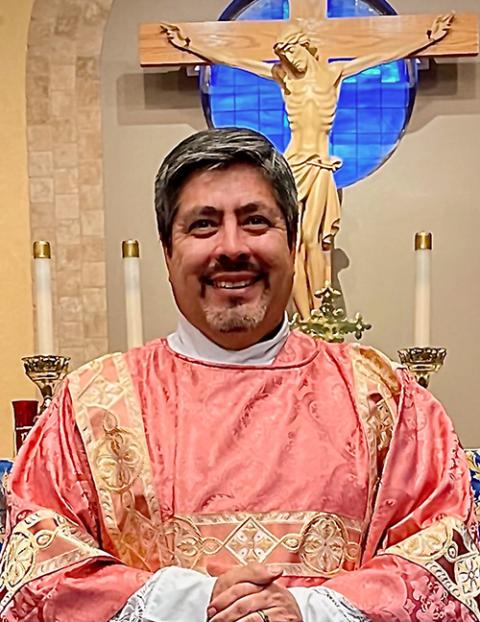
Deacon José Montoya (Courtesy of José Montoya)
Amid the anti-immigrant rhetoric of Donald Trump's 2016 presidential campaign, Sample condemned racial bigotry and told Hispanic Catholics that he loves them and God loves them.
In a video from 2023 posted on the Hispanic ministry page, the archbishop — with an image of Our Lady of Guadalupe in the background — says the "Hispanic community is the church."
"I want the leadership here to know that I intend to be even more and more focused on this ministry as we move forward," Sample says, adding that he understands the community seeks additional spiritual formation and improved communication.
"Are these just words from the archbishop?" asked Montoya. "Where are the actions?"
The deacon, trained as an engineer, emigrated from Mexico 33 years ago. "When you come to the United States, there is a feeling of uprootedness — nobody talks to you because they don't speak the language, they look at you like you are worth nothing, you feel like nobody wants you," he said. "The place you find refuge is the church."
"Like Christ calls us, we must welcome immigrants," said Montoya. "That is why it is very, very discomforting to hear what's happening in our church, happening here to our people."
Editor's note: Katie Collins Scott, who reported this story, and Patricia Montana previously worked together for the two now-closed Portland archdiocesan newspapers — the Catholic Sentinel and El Centinela, respectively.

